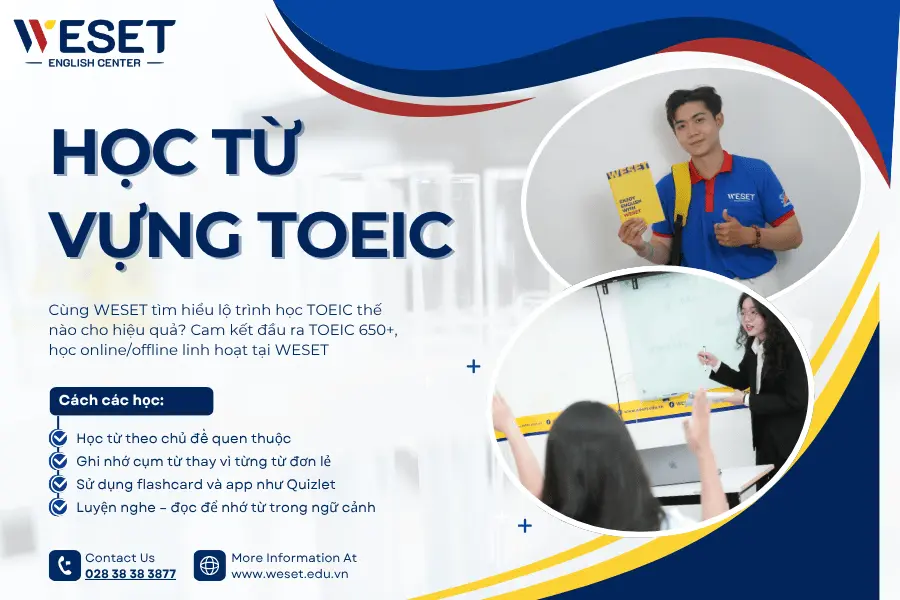Trang chủ Blog Blog IELTS IELTS Speaking Part 3: Các dạng câu hỏi & Cách trả lời
IELTS Speaking Part 3: Các dạng câu hỏi & Cách trả lời
- Jonathan M. Pham
- Blog IELTS
MỤC LỤC

IELTS Speaking Part 3 thường được đánh giá là phần khó nhất trong bài thi Speaking. Trong bài viết dưới đây, WESET sẽ chia sẻ với bạn các chủ đề, câu hỏi và gợi ý trả lời mẫu cho phần thi này. Hy vọng những thông tin dưới đây sẽ hỗ trợ bạn chuẩn bị tốt hơn cho kỳ thi IELTS của mình!
IELTS Speaking Part 3 là gì?
Bài thi Speaking được chia thành 3 phần: Part 1, Part 2 và Part 3. Ở phần cuối cùng, giám khảo sẽ đặt cho thí sinh một số câu hỏi về nhiều topic khác nhau. Bộ câu hỏi được thiết kế nhằm đánh giá khả năng nói trôi chảy và chính xác của thí sinh về các chủ đề tương đối học thuật.
Các chủ đề IELTS Speaking Part 3
Trong phần 3, bạn sẽ được yêu cầu trình bày tròng thời gian từ 1-2 phút cho từng chủ đề được chọn. Câu hỏi Part 3 nhìn chung khó hơn trong 2 phần trước, đòi hỏi bạn phải có vốn kiến thức, từ vựng và khả năng lập luận nhất định để làm tốt nhất.
Các chủ đề Part 3 rất đa dạng, dao động từ education (giáo dục), study (việc học) work/ job (công việc), travel (du lịch), leisure activities (hoạt động giải trí), sports (thể thao), family (gia đình), friends (bạn bè), health (sức khỏe), festival (lễ hội), communication (giao tiếp), Internet, celebrity (người nổi tiếng), v.v… Những topic ít gặp hơn có thể kể đến như: getting lost (bị lạc), success (thành công), countryside (miền quê), transportation (giao thông), weekend (cuối tuần), v.v…
Ví dụ về các dạng câu hỏi trong IELTS Speaking Part 3:
- What are the advantages and disadvantages of (topic)?
- Do you think that (topic) is important? Why or why not?
- What changes do you think should be made to (topic)?
IELTS Speaking Part 3 questions – with sample answers
Dưới đây là tổng hợp một số câu hỏi – kèm bài mẫu – theo từng chủ đề Part 3.
Topic Technology
-Do you think that technology is important? Why or why not?
Yes, I do think it is essential to life. Technology has revolutionized the way we live and work, by helping us to communicate with each other, connect with the world, and access information quickly and easily. For instance, we can now use smartphones to access the internet, which allows us to do research or book appointments without having to go to a physical location.
Additionally, technology makes our lives easier and more efficient. For example, we can now use GPS to get directions, or set alarms to remind us of necessary appointments. In the past, people had to rely on maps and their memory to get around, which was often unreliable.
-What are the advantages and disadvantages of technology?
The advantages of technology are that it has made our lives easier and more efficient. For example, we can now do our shopping online and have it delivered to our door, or book a holiday online without having to go through a travel agent. Technology has also made it easier for us to keep in touch with friends and family who live far away.
The disadvantages of technology are that it can be addictive and make us lazy. For instance, we can now order food to be delivered to our door, which means we don’t have to go out and cook. This can lead to us eating unhealthy foods and not getting the exercise we need. Additionally, too much time spent on technology can lead to social isolation as we stop interacting with people face-to-face. In fact, research has shown that many people have become so reliant on technology that they have completely lost touch with the real world.
-What changes do you think should be made to technology?
I think that there should be more guidelines regulating how technology is used. For example, there should be limits on the amount of time that children can spend on their devices.
Additionally, there should be more education on the dangers of addiction and social isolation so that people are aware of the risks before they start using technology.
Finally, I think that there should be more research into the long-term effects of technology use so that we can understand the full extent of its impact on our lives.
Topic Famous Person
-Do you think that famous people are generally happier than ordinary people?
There is no definitive answer to this question as it depends on the individual. Some people may find fame and fortune to be a blessing, while others may feel overwhelmed and stressed by the attention they receive.
Overall, I think that famous people are generally happier than ordinary people, but there are always exceptions. This is because being in the public eye often comes with many perks, such as financial security and a platform to advocate for causes that they believe in. Additionally, famous people often have a team of support staff to help them with their day-to-day lives, which can make life easier.
However, there are downsides to fame as well. For example, celebrities may have difficulty maintaining healthy personal relationships due to their hectic schedules, and they may also suffer from anxiety or depression due to the pressure of living up to public expectations.
-What qualities does a person need to have in order to be famous?
There are many qualities that a person would need to have in order to be famous. Some of these qualities may include being outgoing and confident, having a great personality, being articulate, and being able to captivate an audience.
Additionally, a person would need to have some kind of talent or skill that sets them apart from the rest. For example, they could be a great singer, dancer, actor, or athlete.
Finally, they need to be able to handle the pressures of being in the public eye, as well as having a thick skin and staying grounded.
-Do you think that being famous is more important than being happy?
No, I don’t think that being famous is more important than being happy. I believe that happiness is more important than fame because it is a state of mind that can be achieved by anyone, regardless of their circumstances. Additionally, happiness is something that comes from within, whereas fame is often reliant on external factors such as public opinion.
Fame may bring with it some advantages, such as financial security and opportunities to help others, but ultimately it is not worth sacrificing your own happiness for. Everyone should strive to find what makes them truly happy in life, regardless of whether or not they become famous.
Topic Environment
-Are there many environmental problems in your country?
Yes, there are many environmental problems in my country. One of the most pressing issues is deforestation. Vietnam has lost a significant amount of forest cover in recent years, and this has had a negative impact on the environment.
Another issue is air pollution. The level of air pollution in some cities is very high, and this is having a harmful effect on people’s health.
There are also concerns about the quality of the water supply, and some parts of the country are facing a serious water scarcity problem.
-What do you think are the main causes of these problems?
There are many factors that contribute to environmental problems. One of the main causes is the growing population. As more and more people are born, there is more demand for resources such as land, water, and food. This often leads to environmental degradation as people encroach on natural habitats in order to meet their needs.
Another major cause of environmental problems is industrialization. As countries develop economically, they often do so at the expense of the environment. For example, factories release harmful chemicals into the air and water, and this can cause pollution.
-What do you think could be done to reduce these problems?
There are a number of things that could be done to reduce environmental problems. One solution is to promote sustainable development, which would help to reduce the impact of human activity on the environment. This could be done through education and awareness-raising campaigns.
Another way to reduce environmental problems is by investing in renewable energy sources, such as solar and wind power. This would help to decrease reliance on fossil fuels, which are a major contributor to greenhouse gas emissions and climate change. Finally, government regulations could be put in place to prohibit activities that are damaging to the environment, such as illegal logging or dumping toxic waste.
Topic Sports
-Do you think sport is important? Why or why not?
Yes, I do think sport is important – for a lot of reasons. Firstly, it provides a great way for us to get exercise – which is critical for people to stay healthy and fit, as well as to prevent diseases such as heart disease and cancer.
Secondly, sport can help build teamwork skills. Playing sport with others teaches people how to work together as a team and cooperate towards a common goal.
Secondly, sport can help build teamwork skills. Playing sport with others teaches people how to work together as a team and cooperate towards a common goal.
Finally, sport can be a fun way to spend time with friends and family. Playing sport is a great way to socialize and make new friends.
-What benefits do international sporting events bring?
There are several benefits that international sporting events bring. Firstly, they bring together athletes from all over the world to compete in a fair and friendly competition. As a result, this helps build relationships between different countries and allows people to learn about new cultures.
Secondly, international sporting events generate a lot of revenue for the host country. This can be used to improve infrastructure and facilities, as well as to provide more opportunities for people to participate in sport.
Thirdly, international sporting events raise the profile of the host country and can help to promote tourism.
Thirdly, international sporting events raise the profile of the host country and can help to promote tourism.
-Do you think there are any negative impacts of hosting an international sporting event?
There can be some negative impacts of hosting an international sporting event. One of the main concerns is the cost – often, these events are very expensive to stage, and this can put a strain on public finances.
Another potential downside is that some countries use these events as an opportunity to showcase their military power or political ideology – which can lead to tension and conflict. Finally, there is the risk that some athletes may use banned substances in order to gain an advantage. This can damage the reputation of the sport and lead to unfairness in competition.
Topic Travelling
-Has travel become safer in recent years?
Yes, I think travel has become much safer in recent years. There are now many more options for safety, including online travel guides and apps that can help you stay safe while travelling. In addition, there are also more security measures in place at airports and other travel hubs.
-What precautions do you take when travelling?
There are a few precautions that I always take when travelling. Firstly, I make sure to research my destination before I go – so that I am aware of any potential risks or dangers. Secondly, I try to travel with someone else whenever possible – as it is always safer to have someone with you. Finally, I make sure to keep all of my important documents and belongings close to me at all times – so that they don’t get lost or stolen.
-Do you think there are any disadvantages to travelling?
Yes, there can be some disadvantages to travelling. One of the main ones is the cost – travel can be very expensive, especially if you are travelling to a foreign country. Another potential downside is that you can often miss out on important events or opportunities while you are away. Finally, there is the risk of getting sick while travelling – as you are exposed to new environments and different types of bacteria.
Topic Mobile phone
-What is the impact of cellphones?
There is no question that cellphones have had a profound impact on society. Probably the most obvious impact is the way that they have changed the way we communicate. Cellphones allow us to stay in touch with friends and family no matter where we are. This has led to a decrease in the use of traditional forms of communication, such as letters and phone calls.
Another impact of cellphones is the way that they have changed the way we work. With access to email and the internet, people can now work from anywhere. This has led to a increase in telecommuting, which is a trend that is likely to continue in the future.
-Do you think cellphones are a good or bad thing?
I think there are both good and bad aspects to cellphones. On the one hand, they have made communication much easier and more convenient. On the other hand, they have also led to a decrease in face-to-face interaction, which can be detrimental to social skills.
-What precautions do people need to take when using cellphones?
There are a few precautions that people need to take when using cellphones. Firstly, it is important to use them in a responsible way – for example, by not using them while driving or in other dangerous situations.
Secondly, it is important to be aware of the potential risks of radiation exposure from prolonged use of cellphones.
Finally, it is important to be aware of the potential for data breaches when using cellphones – as they can store a lot of personal information.
Finally, it is important to be aware of the potential for data breaches when using cellphones – as they can store a lot of personal information.
Topic Music
-What do you think about illegal downloading of music? What should be done about it?
Illegal downloading of music has become a huge problem in recent years. I think it’s wrong, and I don’t think people should do it. A lot of money goes into making music, and people who download it illegally aren’t respecting the artists or the people who work hard to make the music.
I think governments should do more to crack down on illegal downloading. There should be harsher penalties for people who do it, and websites that allow it should be shut down. This would send a message that illegal downloading is not acceptable, and people would be more likely to stop doing it.
-What would the advantages and disadvantages of being stricter about illegal downloading of music be? Would it generally be a good thing?
The advantages of being stricter about illegal downloading of music would be that it would help to protect the rights of musicians and songwriters, and it would help to ensure that they are fairly compensated for their work.
The disadvantages of being stricter about illegal downloading of music would be that it could potentially lead to increased levels of piracy, and it could also hamper freedom of expression and creativity.
The disadvantages of being stricter about illegal downloading of music would be that it could potentially lead to increased levels of piracy, and it could also hamper freedom of expression and creativity.
In general, I think it would be a good thing to be stricter about illegal downloading of music, as it would help to protect the rights of artists and ensure that they are fairly compensated for their work.
-What do you think about the way music is distributed now?
I think the way music is distributed now is very different to how it was distributed in the past. In the past, people would buy CDs or vinyl records, and they would physically own the music. Now, with digital downloads and streaming services, people can listen to music without owning it.
Personally, I prefer to own my music – I like having a physical copy that I can hold and look at. But I can see why some people prefer the convenience of digital formats.
Topic Holidays
-Why do you think people go on holiday?
Some people go on holiday to escape the reality of their lives. They want to get away from their job, their family, and their daily routine. Holidays are a chance to relax and forget about all of the stress in their lives.
Other people go on holiday to experience new cultures and lifestyles. They want to explore different countries and meet new people. For them, holidays are an opportunity to learn about other ways of life and to broaden their horizons.
-Why do some people go on holiday alone?
There are many reasons why people might choose to go on holiday alone. Some people may feel that they need some time away from their friends and family, while others may prefer the solitude of travelling by themselves.
Some people also find that they can get more out of their holiday if they’re not travelling with a group, and can explore new places and cultures without having to worry about other people’s opinions or preferences.
Some people also find that they can get more out of their holiday if they’re not travelling with a group, and can explore new places and cultures without having to worry about other people’s opinions or preferences.
-What are the advantages and disadvantages of going on holiday with a group of friends?
Some people might find that going on holiday with a group of friends is more fun, as there’s more chance to socialise and explore new places together. However, it can also be more expensive, as you have to split the cost of accommodation and travel between everyone in the group.
It can also be more difficult to organise a group holiday, as everyone needs to agree on where to go and what to do. And if one person in the group isn’t happy with the plans, it can ruin the whole trip for everyone else.
ultimately, it’s up to each individual to decide whether they want to go on holiday alone or with a group of friends.
ultimately, it’s up to each individual to decide whether they want to go on holiday alone or with a group of friends.
Topic Education
-What is the difference between the way children learn and the way adults learn?
There is a significant difference between the way children learn and the way adults learn. Children are more inclined to learn through exploration and play, while adults are more likely to use their prior knowledge and experience to learn new information.
Additionally, children are more likely to be motivated by external factors such as praise or rewards, while adults are more likely to be motivated by a sense of personal accomplishment.
-What do you think is the most important thing that schools should teach children?
There are many things that schools could potentially teach children, but I believe that the most important thing is to teach them how to think for themselves. Too often, children are spoon-fed information and told what to think, without being given the opportunity to develop their own opinions.
If children are taught how to question information and make their own decisions, they will be better equipped to deal with the complexities of the world around them.
-How can a teacher make lessons for children more interesting?
There are a number of ways that a teacher can make lessons more interesting for children. One way is to use interactive and hands-on methods, such as games, activities and experiments.
Another way is to make the material relevant to the children’s lives and experiences. For example, if you’re teaching a history lesson, you could relate it to something that happened in the news recently.
Lastly, you could try using different methods of delivery, such as stories, songs or videos. This will help to keep the children engaged and interested in what you’re teaching them.
Topic Helping others
-Why do you think some people like to help other people?
I think some people like to help other people because it makes them feel good. When you help somebody else, it feels like you’re doing something good and that makes you feel happy.
Plus, I think it’s a way of showing other people that you care about them and that you want to make their lives better.
-What are some of the things people can do to help others?
There are many things that people can do to help others. Some people might choose to volunteer for charities or community organisations, while others might donate money or goods to those in need.
Some people might even choose to help out their friends and family members when they need it. And sometimes, just being there for somebody – lending a listening ear or offering a shoulder to cry on – can be the best form of help.
-Do you think it’s important for people to help others?
I believe that it’s important for people to help others, but I don’t think it should be mandatory. Some people might not have the time or the resources to help others, and that’s okay.
But if somebody is in a position where they can help another person, then I think it’s a nice thing to do. It shows that we care about each other and that we’re willing to go out of our way to make somebody else’s life better.
Cách trả lời IELTS Speaking Part 3
Có nhiều cách tiếp cận khác nhau đối với IELTS Speaking Part 3; ở đây, chúng tôi muốn giới thiệu mô hình 3 bước (ORE):
- Opinion (Ý kiến)
- Reason (Lý do)
- Example (Thí dụ)
Cách tiếp cận này đơn giản và dễ nhớ, cộng với nó bao gồm tất cả thông tin mà giám khảo sẽ tìm kiếm. Hãy xem nó hoạt động như thế nào với câu hỏi sau:
-What do you think are the benefits of learning a foreign language?
Opinion: I think there are many benefits to learning a foreign language.
Reason: It can help you to communicate with people from other cultures, understand their perspectives and build relationships with them.
Example: For instance, I have a friend who is from Spain and we often meet up to practise our Spanish together. I’ve also been able to travel to her country and visit her family because I can speak her language. Without being able to speak Spanish, none of this would have been possible
Như bạn có thể thấy, cách tiếp cận ý kiến-lý do-ví dụ là một cách tuyệt vời để cấu trúc câu trả lời của bạn và đảm bảo rằng bạn bao gồm tất cả thông tin có liên quan. Thêm vào đó, nó dễ nhớ sẽ giúp bạn tự tin hơn khi nói trong Phần 3.
Tổng hợp tips IELTS Speaking Part 3
Dưới đây là một số bí quyết giúp bạn thực hiện phần thi này đạt kết quả tốt hơn.
1. Trình bày một cách tổng quát
Part 3 là cơ hội để bạn thể hiện cho giám khảo thấy năng lực thảo luận, đưa ra ý kiến và quan điểm về những chủ đề tổng quát. Thay vì nói về bản thân, bạn có thể sử dụng các cụm từ sau để mở rộng cuộc thảo luận:
- It’s common for people to think that…
- A lot of people believe that…
- It’s often said that…
- People tend to think that…
Example question: What do you think are the benefits of learning a foreign language?
Possible answer: A lot of people believe that learning a foreign language has many benefits. It’s often said that it can help you to communicate with people from other cultures, understand their perspectives and build relationships with them. For instance, I have a friend who is from Spain and we often meet up to practise our Spanish together. I’ve also been able to travel to her country and visit her family because I can speak her language. Without being able to speak Spanish, none of this would have been possible.
2. Sử dụng các từ/cụm từ liên kết
Cố gắng tránh nói những từ vô nghĩa như um, er, ah, eh – đây là dấu hiệu cho giám khảo thấy bạn không thể tìm được từ cần thiết để thảo luận về chủ đề. Ngoài ra, cũng cần tránh sử dụng lặp đi lặp lại các câu nói “câu giờ như: “yeah, like, you know”.
Tùy thuộc vào câu hỏi cụ thể, bạn có thể lựa chọn sử dụng các từ/cụm từ nối (linking word/phrase) sau:
Tùy thuộc vào câu hỏi cụ thể, bạn có thể lựa chọn sử dụng các từ/cụm từ nối (linking word/phrase) sau:
- Sắp xếp theo trình tự (to begin with, secondly, subsequently, on top of that, later, after this, finally]
- Bổ sung thông tin (also, besides, one more thing, additionally, another example, another reason for this,).
- Nêu quan điểm & thái độ (however, to be honest, unfortunately, definitely, basically, if you ask me, thankfully, as a matter of fact).
- So sánh và đối chiếu (in the same way, likewise, in a similar fashion; Although, instead of, on the other hand, whereas).
- Đưa ra ví dụ (a great example of this is, for instance, in other words, such as, illustrated by).
- Cần thêm thời gian suy nghĩ (let me think, that’s an interesting question, I haven’t thought of that before, well).
- Khái quát/ Tổng kết (Generally speaking, on the whole, in most cases).
- Kết quả [As a result, therefore, hence, consequently, then]
3. Sẵn sàng mở rộng câu trả lời
Một lưu ý quan trọng trong IELTS Speaking Part 3 – đó là bạn phải cho giám khảo thấy rằng bản thân sẵn sàng thảo luận về chủ đề được chọn. Vì lý do này, hãy dành thời gian nghiên cứu và thực hành với nhiều chủ đề khác nhau trước khi thi.
Hầu hết các chủ đề đều đã được lựa chọn kỹ lưỡng để đảm bảo phù hợp với tất cả các cấp độ thí sinh. Tuy nhiên, đừng ngại hỏi lại giám khảo nếu bạn cần giải thích một thuật ngữ nào đó mà bạn chưa rõ trong câu hỏi.
Khác với các bài kiểm tra dựa trên máy tính (AI) như TOEFL iBT, bài thi IELTS Speaking có lợi điểm là thí sinh được tương tác trực tiếp với giám khảo. Trong quá trình thực hiện phần thi, giám khảo sẽ khuyến khích bạn trình bày thêm – để thấy được bạn hiểu về chủ đề được chọn ở mức nào.
Khác với các bài kiểm tra dựa trên máy tính (AI) như TOEFL iBT, bài thi IELTS Speaking có lợi điểm là thí sinh được tương tác trực tiếp với giám khảo. Trong quá trình thực hiện phần thi, giám khảo sẽ khuyến khích bạn trình bày thêm – để thấy được bạn hiểu về chủ đề được chọn ở mức nào.
Đọc thêm: Tổng hợp các IELTS Speaking Topics thường gặp
Tài liệu ôn tập IELTS Speaking Part 3
Sau đây là gợi ý một số đầu sách – bao gồm câu hỏi, câu trả lời mẫu, kèm một số mẹo và lời khuyên hữu ích để bạn thực hành thêm cho bài thi Speaking Part 3:
- “IELTS Speaking Part Three: Topics, Questions & Sample Answers” by Collins IELTS
- “IELTS Masterclass: Speaking Part Three” by Oxford University Press
- “IELTS Speaking Part Three: The Complete Guide” by Cambridge IELTS Consultants
- v.v…
Lời kết
IELTS Speaking Part 3 là một phần thi không đơn giản. Tuy nhiên, bằng cách thực hành với nhiều chủ đề, câu hỏi và câu trả lời mẫu khác nhau, bạn sẽ có cơ hội “vượt ải” IELTS dễ dàng hơn hẳn.
WESET hy vọng bạn tìm thấy những nội dung hữu ích từ chia sẻ trên đây. Nếu bạn đọc quan tâm đến lộ trình học IELTS cho người mới bắt đầu, vui lòng comment dưới đây để được giải đáp thêm. Và đừng quên đăng ký nhận bản tin WESET – cũng như xem qua thư viện bài mẫu do đội ngũ trung tâm biên soạn bạn nhé!
Jonathan M. Pham
Xin chào bạn! Tôi là Jonathan M. Pham. Tôi có mối quan tâm sâu sắc với các chủ đề về Đào tạo, Ngôn ngữ, Học tập & Phát triển. Mong muốn của tôi là được chia sẻ kiến thức và những trải nghiệm cá nhân với bạn đọc - đặc biệt là những ai có mong muốn phát triển bản thân và nâng cao các kỹ năng trong cuộc sống.
Bài viết mới nhất






